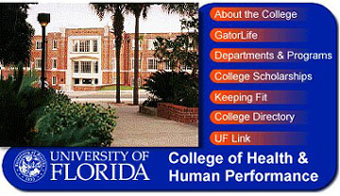


|
|
|
|
|
|
|
|
|
|
|
 |
 |
 |
|||||||
|
|
|
|
|
|
|
|
|||
|
|
|
|
|||||||
|

History and OverviewUndergraduate Degrees
Since our inception in 1947, the College of Health and Human Performance has grown in size and scope. Our focus has changed dramatically during this first 55 years. We have evolved from a college that housed everything from teacher preparation to intercollegiate athletics to the Infirmary (today's Student Health Care Center). Although teacher education is still an important professional preparation area in the college, the highly specialized world in which we live has created an increased need for greater specialization within departments. The primary focus of the faculty and students in the college is helping people protect, maintain, and improve their health and quality of life. The college includes three departments in which students can select a major and/or take courses - Exercise and Sport Sciences, Health Science Education, and Recreation, Parks and Tourism. Each department offers a number of specializations (see chart for details). Additionally, for Recreation, Parks and Tourism students, a list of emphasis options are available for most specializations. See adviser for details. The Department of Exercise and Sport Sciences is concerned with quality of life and the many aspects of human movement. Significant research contributions, education and service are related to the study of physiological and psychological responsiveness to vigorous and relevant physical activities. In addition, movement skill capabilities and ways to improve skills and maintain health are determined for the typical person, the person who is disabled and the high-level athlete. The efficient management and administration of sport and exercise programs are also of interest. Sites for research, student experience and employment include educational institutions, health and fitness centers, businesses and industries, and amateur and professional sports organizations. The Department of Health Science Education prepares students to enter the field of health education. Health educators view optimal health as a multifaceted health status impacted by personal behaviors. The health educator provides the necessary knowledge and skills to enable individuals to make informed decisions concerning lifestyle and personal health behavior by emphasizing accurate information, periodic assessments and self responsibility. The Department of Recreation, Parks and Tourism prepares students for employment in delivery of leisure services in recreational settings, state and national parks, and tourism industries. Research and training in the department focus on understanding the role and impact of leisure services on individuals, society and the environment. Undergraduate DegreesCourses of study lead to three undergraduate degrees: Bachelor of Science in Exercise and Sport Sciences, Bachelor of Science in Health Science Education, and Bachelor of Science in Recreation. To graduate, students must complete curricula requirements with a minimum grade point average as specified by each specialization area; achieve a total of 120 semester hours, 60 of which must be at or above the 3000 level; and complete all course requirements for the major. Prerequisite CourseworkThe state of Florida has determined that the prerequisite coursework required for a major in the state university system (SUS) will be the same for all SUS schools offering the major. In most cases, meeting the prerequisites for admission will be sufficient to meet any course prerequisites. This may not always be the case; however, students who follow the sequence of courses identified in the universal tracking plan for their major will satisfy all course prerequisites within the major, provided they achieve the minimum grades required. |
||||||||||||||
If you need assistance with this web page click here to send email. This page is maintained by the Office of the University Registrar. |